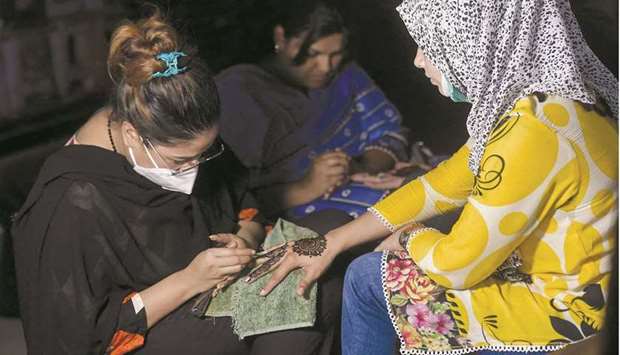Pakistan yesterday began a nine-day shutdown affecting travel and tourist hotspots in a bid to prevent a surge in Covid-19 cases during the Muslim holiday of Eid al-Fitr.
Already battling a third wave of infections amid apprehensions about the crisis across the border in India, the government has imposed the most severe restrictions since a one-month lockdown in April last year.
“These measures have been necessitated by the extremely dangerous situation which has been created in the region with the spread of virulent mutations of the virus,” tweeted planning minister Asad Umar, who has been leading the government response to the outbreak.
Eid, which comes at the end of the Muslim holy month of Ramadan, usually sees the mass movement of people around the country and tourist spots crowded with Pakistanis.
Last year the country saw a spike in cases in the weeks after the celebrations.
Businesses, hotels and restaurants as well as markets and parks will be closed, while public transport between provinces and within cities has been halted.
The military has been mobilised to monitor the restrictions.
Mosques, however, which have been packed each night throughout Ramadan will remain open. Authorities fear curbs on places of worship could ignite confrontation.
Pakistan has seen a daily death toll of more than 100 in recent weeks.
Overall, Pakistan has registered 854,240 infections and 18,797 deaths from Covid-19. While official daily infection numbers remain low, between 4,000 and 5,000, the country conducts only around 40,000 tests a day — a fraction of its 220 million population.
Health officials have warned that hospitals are operating at close to capacity and they have rushed to increase the number of intensive care beds.
International flights have been slashed and border crossings with Iran and Afghanistan closed, except for trade.
Flights and land crossings with neighbouring India — reeling from a devastating outbreak with hundreds of thousands of new cases a day — were closed before the pandemic because of political tensions.
Pakistan, which has so far vaccinated only a fraction of its population, received its first batch of 1.2 million AstraZeneca doses on Saturday under the delayed Covax global vaccine sharing scheme.
Meanwhile, a research centre studying the disease in the country said yesterday a coronavirus variant first discovered in the United Kingdom now accounts for up to 70% of infections across Pakistan.
“There is a 60% to 70% prevalence of the UK variant in Pakistan (today),” Professor Dr Mohamed Iqbal Chaudhry, director at the International Centre for Chemical and Biological Sciences (ICCBS), University of Karachi, told Reuters, adding that this figure was 2% in January.
The ICCBS works on Covid-19 samples and provides research and data to the government.
The “UK variant”, known as B.1.1.7 and first identified in Britain late last year, is believed to be more transmissible than other previously dominant coronavirus variants. Chaudhry added, however, that it was yet to be established if the variant was more deadly.
He also said a variant found in neighbouring India, which has seen a massive surge of cases in recent weeks, had not been detected in Pakistan yet, but that was because they did not have the kits needed to detect the variant, named B.1.617.
The kits to detect the variant had been ordered and would soon arrive in the country, he said.
Chaudhry said there was a high possibility that the variant had already reached Pakistan since the diasporas of the two countries interact closely in Gulf states.
The country has recently stepped up its vaccination drive, inoculating around 3.3 million people.
Pakistan yesterday received its first batch of 1.2 million Covid-19 vaccine doses under its Covax quota, Unicef said in a media release.
“Today Pakistan received its first shipment of Oxford-AstraZeneca Covid-19 vaccines (SII-AZ AZD1222) from the COVAX Facility,” it said.
Covax, a global programme to provide vaccines, has recently been hit by supply problems.

A girl gets her hand decorated with henna paste at a marketplace ahead of the Eid al-Fitr festivities amid the pandemic in Karachi yesterday. (AFP)
